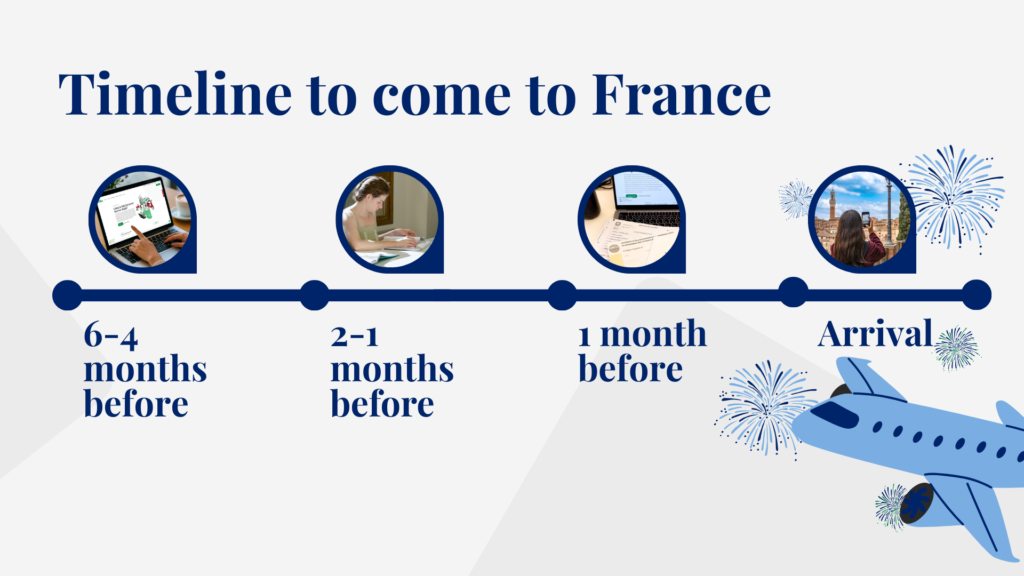For international students learning French, one way to demonstrate your proficiency is by taking the DELF exam.
This article will guide you through everything you need to know about the DELF B2 exam, from its structure to exam day preparation.
What is the DELF
The DELF (Diplôme d’Études en Langue Française) and DALF (Diplôme Approfondi de Langue Française) are official certifications awarded by the French Ministry of Education to assess the French language proficiency of non-native speakers.
The DELF covers levels A1 to B2, evaluating basic to upper-intermediate skills in four areas: listening, reading, writing, and speaking. The DALF, designed for advanced learners, includes levels C1 and C2, demonstrating a high degree of fluency and command of the language.

What is B2 level
B2 corresponds to an upper-intermediate level, equivalent to a university student.
At this level, you should be able to:
- Defend my opinion by providing arguments and examples.
- Develop my point of view and discuss the advantages and disadvantages.
- Express cause and consequence.
- Convince someone.
- Take notes.
- Rephrase an idea.
- Understand the main points of a current affairs document.
Why take the DELF
Taking the DELF is a significant milestone in your French learning journey. It can strengthen your resume (CV) and improve your chances of securing a job in a French-speaking environment. Additionally, many universities require the DELF as proof of language proficiency, making it essential for students planning to pursue higher education in France.
Where to take the DELF
The DELF is available at authorized exam centers worldwide. Since spots can fill up quickly, early registration is advised.
Use this interactive map to find the exam center nearest to you: https://www.france-education-international.fr/en/centres-d-examen/carte

What does the DELF B2 exam look like
The DELF B2 exam is divided into 2 main sections: written tests and an oral test:
| Written tests including: Listening comprehension: 2 exercices Answer comprehension questions based on two recorded documents. Reading comprehension: 2 exercices Answer comprehension questions based on two written documents. Writing: 1 exercise Write a text of at least 250 words to express a personal opinion on a general topic (essay, letter, article, etc.). (Total duration: 2 hous 30 minutes) | Oral test including: Oral expression: Long speech (monologue) Oral expression: Interaction/simulation exercice (Total duration: 20 minutes, with 30 minutes of preparation) |
How is the DELF exam scored
The DELF B2 exam is graded out of 100 points, with each of the four sections (listening, reading, writing, speaking) worth 25 points.
To pass, you must:
- Score at least 50/100 overall.
- Obtain a minimum of 5/25 points in each section. If you score below 5 in any section, you will not pass, regardless of your total score. This ensures a balanced proficiency across all language skills.
What to expect on exam day
The DELF B2 is a paper-based test that includes both written and oral components. Electronic devices are not allowed and bags must be left outside the exam room.
To ensure a smooth experience:
- Follow instructions carefully, manage your time wisely, and stay focused.
- Arrive early (at least 30 minutes before the exam begins).
- Bring required items: ID, registration confirmation, pens, pencils, and an eraser.
What to study for the DELF B2 exam
To succeed, you should be familiar with the following grammar concepts:
- Subjonctif présent et subjonctif passé
- Conjonctions subjonctives
- Structures impersonnelles
- Verbes et adjectifs prépositionnels
- Pronoms relatifs complexes
- Subordonnées au futur et au passé
- Conditionnel présent et conditionnel passé
- Nominalisation
- Connecteurs logiques (hypothèse, opposition, concession, condition, cause, conséquence)

How to prepare for the exam
Preparation is key to success. Here are some effective strategies:
- Regular reading improves comprehension skills.
- Practice with sample papers and past exam papers to familiarize yourself with the format and timing. Sample tests available here.
- Invest in reputable study books and use reliable online resources like TV5Monde and RFI.
The best strategy is to immerse yourself in the language through an intensive preparation program. Our partner language schools in France offer short-term courses specifically designed to prepare students for the DELF. Some of these schools are also official exam centers, allowing you to both prepare for and take the exam in the same location.
Don’t hesitate to contact us with any questions, or to begin your application!





